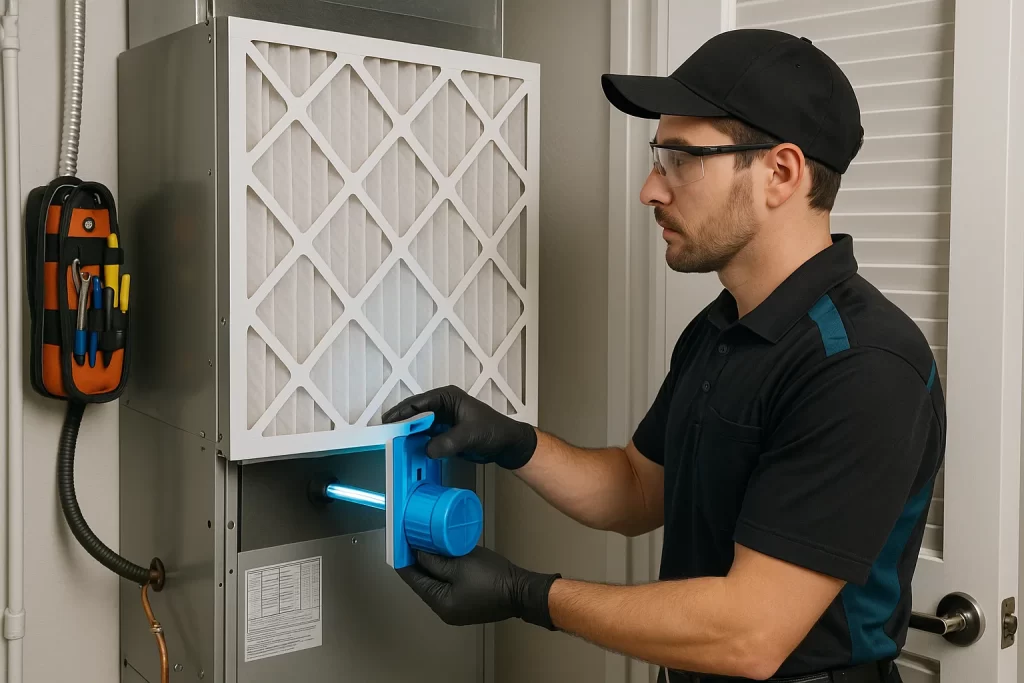When most Floridians think of air conditioning, the first thing that comes to mind is relief from the sweltering heat. And while staying cool is certainly essential—especially during Florida’s long, humid summers—modern air conditioning systems offer so much more than just temperature control.
Today’s AC technology is designed to improve indoor air quality, manage humidity, enhance comfort through zoning, and support overall wellness in your home. Whether you’re building a new home or upgrading an outdated unit, understanding the broader benefits of modern AC systems can help you make smarter, healthier choices for your family and your home.

Modern Filters Improve Indoor Air Quality
In Florida’s subtropical climate, indoor air quality can quickly decline without proper filtration. Mold spores, pollen, dust, and other allergens are ever-present—especially during the rainy season. Fortunately, modern air conditioning systems are equipped with advanced air filtration capabilities that can significantly reduce these airborne contaminants.
High-efficiency filters (such as HEPA or MERV-rated filters) trap fine particles that older systems often miss. Some units even include built-in air purifiers or UV lights that neutralize bacteria and viruses. For allergy sufferers or families with pets, this improvement in air quality can make a noticeable difference in daily comfort and respiratory health.
Why Humidity Control Is Essential in Florida AC Systems
Florida is famous for its humidity, which can make even mild temperatures feel oppressive. Excess indoor humidity not only leads to discomfort—it can also encourage mold growth, musty odors, and damage to furniture, walls, and flooring. That’s why humidity control is one of the most vital features in a modern AC system.
Many newer systems are built with variable-speed compressors and smart thermostats that allow your AC to operate at lower speeds for longer periods. This extended runtime gives the system more time to extract moisture from the air, resulting in better humidity control without overcooling your home. Some systems even pair with dedicated dehumidifiers for optimal indoor conditions.
Maintaining ideal humidity levels—typically between 40-60%—helps you feel cooler at higher temperatures and reduces the workload on your AC system, which translates to lower energy bills and better comfort.
Zoning Systems Allow Room-by-Room AC Control
Older HVAC systems typically offer a one-size-fits-all approach to cooling, but that doesn’t suit every household. Modern systems allow for zoning, a feature that divides your home into separate temperature-controlled areas.
With zoning, you can set the living room to a cooler temperature during the day, keep the bedrooms cooler at night, or avoid wasting energy on rarely used spaces. Not only does this give every member of the family the temperature they prefer, but it also improves efficiency while cutting cooling costs by reducing unnecessary cooling.
Zoning is particularly beneficial in Florida homes with open floor plans, multiple stories, or large glass windows that let in extra heat during the day.
Regular AC Maintenance Ensures Long-Term Efficiency
No matter how advanced your AC system is, regular maintenance is essential to keep it operating at its best. In Florida, where systems often run year-round, routine AC tune-ups twice a year are highly recommended. A proper maintenance visit includes:
- Cleaning coils and filters
- Checking refrigerant levels
- Inspecting electrical connections
- Calibrating thermostats
- Testing airflow and drainage systems
Frequently Asked Questions
Question: What benefits do modern air conditioning systems offer beyond just cooling?
Answer: Today’s air conditioning systems go beyond temperature control. They improve indoor air quality, regulate humidity, enable personalized comfort through zoning, and contribute to overall health and wellness in Florida homes.
Question: How do modern AC systems enhance indoor air quality in Florida?
Answer: Modern systems often include high-efficiency filters (MERV or HEPA), built-in air purifiers, or UV lights that trap fine particles and neutralize allergens, bacteria, and viruses, critical in Florida’s humid, allergen-rich environment.
Question: Why is humidity control important in modern HVAC systems?
Answer: Proper humidity control (ideally between 40%–60%) prevents mold growth, improves respiratory health, protects home infrastructure, and enhances energy efficiency. Today’s systems use smart sensors and controls to maintain ideal moisture levels.
Question: What is zoning in air conditioning and how does it improve comfort?
Answer: Zoning divides a home into temperature-controlled areas. It enables customized cooling, perfect for multi-story or larger homes, while increasing efficiency by directing comfort where it’s needed most.
Question: Are there potential downsides to using air conditioning?
Answer: When poorly maintained or overly used, ACs can cause dry air, mold issues, and respiratory irritation. To avoid this, maintain humidity at 40%–60%, perform regular service and filter changes, and consider adding UV or HEPA filtration.
Making families happy on the Space Coast since 1975. Schedule an appointment with Complete Air & Heat, Inc.
